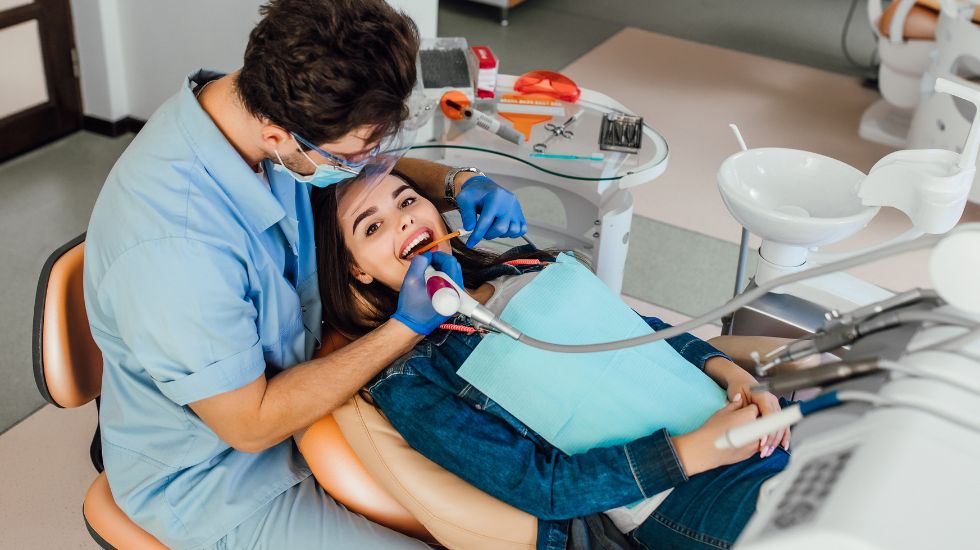
IV sedation dentistry is the deepest form of conscious sedation available in a dental office setting. We understand dental anxiety can hinder your treatment, so we have an anaesthesiologist who delivers sedative medications directly to your bloodstream through an IV line.
During your procedure, the anaesthesiologist monitors your heart rate, blood pressure and oxygen levels. Most people who receive IV sedation dentistry fall asleep and have little to no memory of their treatment when they wake up. This option is best for people with severe dental anxiety or those who are undergoing lengthy procedures.
Instructions for patients before undergoing intravenous sedation
To assist you in the smooth and comfortable completion of your treatment, please follow the checklist instructions below:
- Do not eat or drink anything (including water) for 6 hours before your surgery. If ignored, this could lead to life-threatening consequences.
- Do not smoke or drink alcohol 24 hours prior to surgery.
- Do not drive or operate hazardous machinery the same day after surgery. Arrange transportation with a responsible adult to bring you to and from the office. Someone will need to take care of you for at least 6 hours after leaving the office.
- Do not wear long-sleeve shirts or jeans. Please wear loose-fitting, comfortable clothing, such as a t-shirt with short sleeves. You may wear a sweater/jacket over your shirt/blouse.
- Do not wear heavy makeup, lipstick, jewellery, or contact lenses the day of surgery.
- An adult must accompany patients under the age of 18 years old to our office.
Instruction After Your Appointment
The sedative agents used in your treatment will affect your coordination, memory, and judgment. For 18 to 24 hours after your sedation, DO NOT:
- Drive, cook, or operate machinery.
- Make important decisions or sign papers.
- Take any alcohol
Aftercare Instructions: Extractions and Oral Surgery
Bleeding
- Continue to bite gently on the gauze pack over the wound for 15 minutes to encourage clotting
- Some blood will ooze from the socket for several hours, this is normal.
- Should the wound start to bleed excessively:
– fold the cotton-gauze (provided) or a clean handkerchief and bite firmly for another 30 minutes.
– If prolonged bleeding occurs, contact us or go to the recent hospital
Swelling and Bruising
- Swelling and bruising is a normal and common response to any oral surgery, and its severity differs from person to person. Swelling and bruising usually takes 3 days to reach its maximum, then 10 days to subside.
- If you are experiencing any swelling or bruising, apply an ice pack to the affected area (20 minutes on/20 minutes off) for the first 1 – 2 days. A bag of frozen peas wrapped in a paper towel can work well if an ice pack is not available. Continuing to move your jaw by gentle talking & chewing will also help to minimise any swelling & associated jaw stiffness.
Care after Extraction/Surgery
- Do not rinse for the first 4 hours. (Briefly drinking water to take painkiller tablets is the exception and allowed in the first 4hrs)
- Start brushing and cleaning your teeth like normal within 12hrs of the oral surgery
- Excessive activity is best avoided for 24 hours
- After 24 hours it is best to use warm salty water, or an antiseptic rinse recommended by your dentist. This may be carried out after each meal for 14 days, or until healing is complete. This is to wash food away from the wound (which can disrupt healing).
- A saltwater mouth rinse is made by dissolving a level teaspoon of salt in a glass of warm water.
- The solution should be held in the mouth for 2-3 minutes to bathe the wound and flush out food debris.
-
Avoid smoking or alcohol for at least 7 days
Safe Foods to Eats
- Avoid small hard foods that can get lodged in the open wound like nuts, seeds and grains
- Avoid spicy foods like chillies, and acidic foods like lemon juice etc
- Avoid Alcohol
Controlling Pain
Pain is normal after extraction/surgery and can last 7-10 days. Take pain medication as prescribed by your dentist.
Stitches
- If stitches were placed, these will self-dissolve in 14-20 days. Typically, you do not need to return to get the stitches removed. You should still brush your teeth as normal 12 hrs from the extraction time, but be careful to be gentle around the stitches by not being too vigorous with your toothbrush. Excessive brushing force can damage the stitches and disrupt the tissues from healing normally.
Numbness duration
- Your numbness from the anaesthetic will last 6-8 hours. During this time, be careful not to have anything too hot or cold, as you won’t be able to feel pain if you accidentally burn yourself
- Avoid biting your soft tissues like your lip, cheek and tongue as you may cause a soft tissue injury
Kings Family Dental Centre is one of the trusted dental clinics and has the best dentists in Kings Langley. We offer dental services at cost-effective prices. Contact us at 02 9674 3491 to schedule a dental appointment today.









